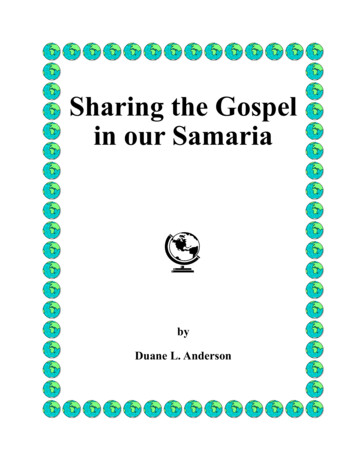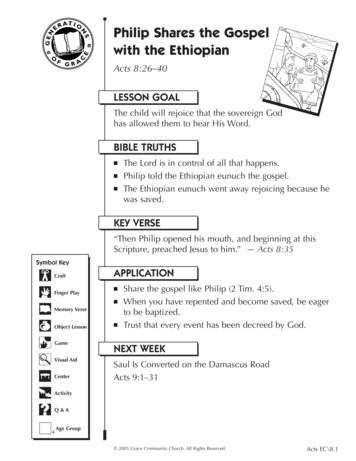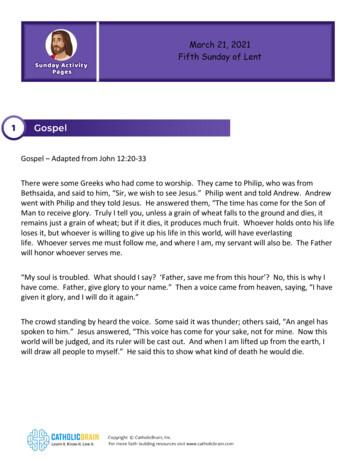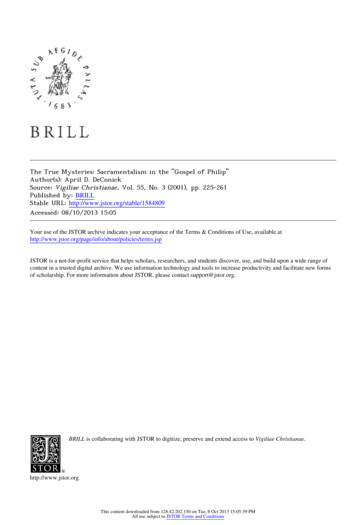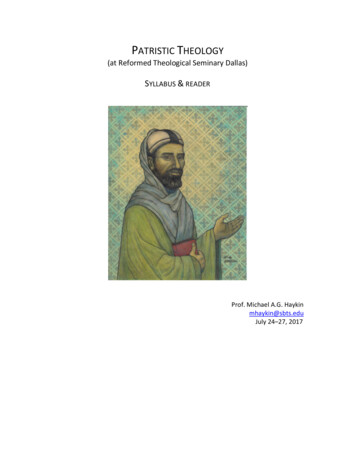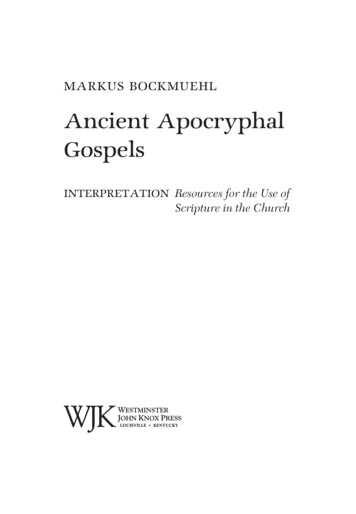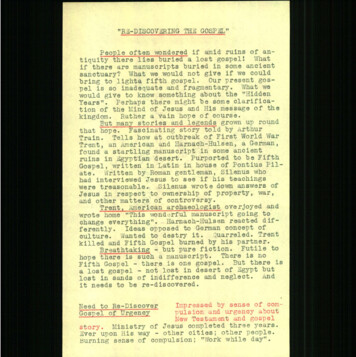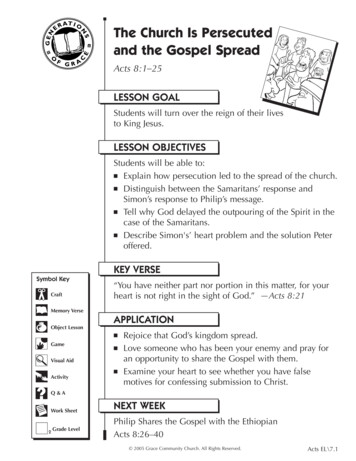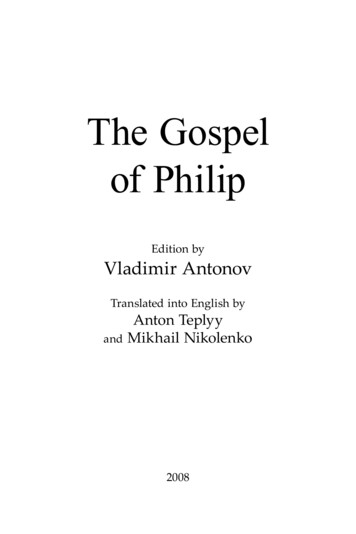
Transcription
The Gospelof PhilipEdition byVladimir AntonovTranslated into English byAnton Teplyyand Mikhail Nikolenko2008
ISBN 978-1438217079This book presents a full and competent translation ofthe Gospel written by apostle Philip — a personal Discipleof Jesus Christ, Who attained Divinity thanks to help fromJesus. The translation is accommpanied by clarifying commentaries.In the Gospel, Philip put the emphasis on the methodological aspect of spiritual work.The book is addressed to everyone aspiring to sus-christ.org Vladimir Antonov, 2008.
PrefaceThe Apocryphal (i.e. not included in the New Testament) Gospel of Apostle Philip, a personal disciple of Jesus Christ, was found by archaeologists in1945 in Egypt. It contains very important information imparted to Philip by Jesus Christ.It concerns the highest meditative techniquesleading spiritual warriors to the Abode of God-theFather, which Philip calls the Bridal Chamber. In theGospel, two narration lines are interwoven: the lineof sexual love between people and the line of thehighest Love for God; the former is considered as aprototype of the latter.The Gospel is written in artistic literary language and is rich of parables.It was not known to Russian-speaking readersuntil now. Three previous editions published inthematic collections were made by translators whodid not understand the meaning of the text. Theymade just attempts to translate the text “literally”,and as a result, the translations were obscure seriesof words not related with each other.The work on creating this edition was done atthe request and with the help of the Author of theGospel. The prototype of this edition of the translation is the editions [3,4]. The commentaries to thetext of the Gospel are typed in small print.3
The Gospel of Philip1. A Hebrew makes a Hebrew, and such a person is called a proselyte. But a proselyte does notmake a proselyte.Those Who came from the Truth are as They wereinitially. And They beget other Men of Truth. Thelatter need only to be born (in It).Proselyte is a person who recently accepted faith.Those Who came from the Truth are Those Who camefrom the Abode of God-the-Father. They can lead Theirdisciples into this Abode, thus allowing them to be “born”in It.2. A slave can hope only to become free. A slavecannot expect to inherit the estate of the master.Yet a Son is not only a Son, but also a Co-ownerof His Father’s estate.A Son of God-the-Father, coessential to Him, is a Coowner of His property.3. There are those who inherit the perishable.They belong to the perishable, and thus they inherit the perishable.Those Who inherit the Imperishable are imperishable. They become owners of both the Imperishable and the perishable.People of the perishable inherit (really) nothing.Because what can a perishable man inherit?If the one who leaves the body inherits the TrueLife, it means that such One is not dead but will live.4
The One Who has attained the Father through efforts onself-development achieves the True Life after the death of thebody. He or She becomes a Co-owner with the Father bothof the Heavenly and of the earthly.4. A pagan does not die because has not (really)lived. So, there is no point in speaking about a pagan’s death.But those who have accepted the Truth beginto live, and there is a danger of dying for them because they live.To die in this context means to go astray from the Pathto the Father. This is a spiritual death.5. Since the day of Christ’s incarnation, the prosperity came, the cities revived, the death movedaway.6. When we were Hebrews, each of us had onlya mother. But since we became Christians, we haveboth the Father and mother.In the Judaic tradition, God was called Father. And Jesussuggested to His followers that they call only God — Father,not the earthly parent.Philip says that the true followers of Christ have nowthe True Father.7. Those who sow in winter reap in summer.The winter is the earthly, but the summer is another eon. Let us sow on the Earth in winter so thatwe may reap the harvest in summer!Therefore, we should not pray to God for the winter, because the winter is followed by the summer.5
But the one who tries to reap in winter will notreally reap but only pluck out the sprouts.In warm regions, people sow in winter, not in spring asit is done in cold regions.The Greek word eons denotes spatial dimensions; amongthem are those called hell, paradise, the abode of the Creator.In “winter”, i.e. while we are on the Earth, we have towork in order that in “summer” we live in sufficiency andbliss of the highest eons.8. The one who does not follow this — will notreap the harvest. Moreover, such one will not onlybe without the harvest, but will have no strength inthe Sabbath.The one who does not work hard to make oneself betterduring the entire incarnation will not receive good fruitsafter it.Philip symbolizes the period of time allocated for thiswork with the images of “winter” and “workweek”; thenthe time for rest comes — “summer”, “Sabbath-Saturday”(Saturday is the Jewish day of rest).9. Christ came to “ransom” some: to liberate, tosave. He “ransomed” strangers making them Hisown.Afterwards, He set apart His own — those whomHe ransomed by His will.He laid down Himself (on the Path of sacrificialservice) when He Himself willed it — not only whenHe revealed Himself to people, but from the very dayof the Creation of the World, He laid down Himself.6
He was incarnated, and afterwards He — whenHe willed — withdrew Himself. He was in the handsof robbers and was taken captive. He liberated Himself and saved also those who were regarded as goodand bad in this world.10. Light and darkness, life and death, right andleft — are brothers of one another; they are inseparable (in earthly people). Because of this, among them— the good are not good, the bad are not bad, andtheir life is not life, and their death is not death.So, one should begin with separating all thesein oneself.Those who have detached themselves from theearthly become whole, eternal.The one who has entered on the spiritual Path has toseparate in oneself the true, eternal, valuable for life in thehighest eons — from the false, which belongs only to thisworld. Then one has to cultivate in oneself the first and getrid of the second.Those Who have accomplished this become eternal inthe Divine eons.11. The importance attached to earthly things isa great delusion, for they divert our thoughts fromthe One Who is eternal to that which is transient.And in this case, the one who hears about God doesnot perceive (behind this word) the Eternal, butthinks about the transient. In the same way, behindthe words the Father, the Son, the Holy Spirit, the Life,the Light, the Resurrection, and the Church — peopledo not perceive the Eternal, but think about the tran7
sient, unless they have already cognized the Eternal(through personal spiritual experience). These wordsare only misleading to earthly people.If they were in the (Divine) eons, they would notuse these words among earthly concerns and things,because these notions are related to the (Divine) eons.In the same way, in Russia many people use the exclamation “Lord!” as a swear word in situations when othersimilar people use obscene language.And God-the-Father, Who is the Universal Ocean of thePrimordial Consciousness, is pictured on Orthodox icons asan old man sitting on a cloud.Hardly one of the “pastors”, not to mention the “flock”,can answer the question “Who is the Holy Spirit?”.Most “believers”, as well as atheists, understand theword life only as life in a body, mourning those who lefttheir bodies, pitying them 12. One name is not uttered among the earthly — the name which the Father grants to a Son. Itis above all. This name is the Father. The Son wouldnot have gotten this name if He had not become theFather.Those who bear this name know this, but Theydo not speak about this. But those who do not bearthis name do not know Them.Names in this world are invented because it isnot possible to cognize the Truth without them.The Truth is one, but It is presented as Many.This is for our sake: to lead us to the cognition of theOne through love for Many.People who have not cognized the Father personally arenot capable of seeing, recognizing a Son. And if a Son tries8
to speak to them about His coessentiality to the Father, suchpeople only become angry with Him.13. The earthly rulers wanted to deceive people,since they understood that people have the sameorigin with the really worthy. They took good namesand gave these names to bad things in order to deceive people and bind them to the bad in this way.And now these earthly rulers suggest to people thatthey keep away from the “bad” and cling to the“good”. These earthly rulers strive to make formerlyfree men slaves forever.14. There are powers which give (power) to people, not wishing to save them. They do this (in order to subjugate them).People, wishing to be saved, made sacrifices. Buta reasonable one (understands clearly that) sacrificesare not necessary and animals should not be offeredto deities. In fact, those who offered animals as asacrifice were themselves like animals (by the levelof their development) When a sacrifice was made (animals were offeredto deities). Though animals were offered alive, theydied.But the one who offers oneself dead to God —(verily) will live.Here, the last paragraph needs to be commented.The fact is that man is not a body. Man is a consciousness, a soul. So, it is wrong to say that man is dead if thebody has died. It is the body that died, but the man did not.9
One can also consider death of man (as a soul, i.e. spiritual death) in the sense implied by the words of Jesus: “FollowMe, and let the dead bury their dead!” (Matt 8:22; Luke 9:60).But in this part of His Gospel, Philip means anotherdeath — the death of one’s lower individual self, and thisimplies the realization of the Higher Self, i.e. Mergence ofthe developed consciousness with the Creator. Such a person attains the Eternal Life in the Abode of the Creator inMergence with Him.15. Before Christ came, there was no bread ofHeaven. It was like in paradise at the time of Adam:there were many trees — food for animals, but nowheat — food for man. Man used to feed like animals.But when a Christ — Perfect Man — comes, Hebrings the bread from Heaven so that people mayeat human food.People without the true knowledge about their predestination and the Path, live a life quite comparable to the lifeof animals. God, through a Christ, gives them spiritual foodappropriate to humans.16. The earthly rulers thought that what they didthey did by their own power and will. But in reality the Holy Spirit in secret accomplished all thatthrough them — accomplished as He consideredappropriate.Also They sow everywhere the true knowledge,which existed since the beginning. And many people see it while it is being sown, but only a few ofthem recall about it by the time of the harvest.10
The Holy Spirit directs the deeds of people when necessary. But people usually are not aware about this.In particular, He — through vicious people — createsfor other people difficulties in the form of temptations, enticements, such as false doctrines, for example. This is donefor the sake of intellectual development of embodied people.After all, they are sent here to learn, not just to live.The meaning of our lives on the Earth consists in ourself-development, which must go in three main directions: intellectual, ethical, and psychoenergetical. And our Teacheris God.Diligent students, after graduating from this School, areinvited by the Father, if they deserve, to His Abode to mergethere with Him forever.But remedial students remain forever “repeaters”, become slaves of this world.The time of the “harvest” is the end of the world: theSchool is closed, the worthy students move to the Abode ofthe Father, enriching Him with Themselves; the lot of therest is the outer darkness: destruction, death of the souls. A special comment has to be made concerning theuse of the pronoun They with regard to the Holy Spirit inthis fragment. This is not an error: the Holy Spirit is indeedan aggregate of former humans who attained in their development the right to be in the Highest eons.17. Some said that Mary conceived by the HolySpirit. They are in error. They do not understandwhat they say. When did a woman ever conceiveby a woman?Mary at the same time is the immaculacy, whichwas not defiled by violence.She is a great temptation to Hebrews, both tothose who preach and to those who listen to theirpreaching.11
Her immaculacy, which was not defiled by violence, is pure. But the mighty of this world defiledthemselves (through their fantasies).And the Lord (Jesus Christ) would not have said,“My Father Who is in Heaven,” if He had not hadanother father. He would have said simply: “My father”.In Greek, in which the Gospel was written, the Holy Spirit is of feminine gender. This is the reason for the irony ofPhilip in the beginning of the fragment.18. The Lord said to the disciples, “Enter the Houseof the Father. But do not take anything in the Houseof the Father, nor carry anything out.”The last phrase of Jesus is a joke, because in “the Houseof the Father” — in the highest eon — there are no material objects that can be carried out as from the house of anearthly father.But to enter the Abode of the Heavenly Father and tosettle there forever is the Goal of the evolution of every person.19. Jesus is a human name. Christ is a title. Forthis reason the name Jesus is not found in other languages; He was just named Jesus.Christ in Syriac is Messiah; Christ is a Greekword. Other languages also have this word — according to their spelling.The Nazarene means “The One Who came fromthe Truth”.Christ is not the last name of Jesus as some believersthink. Christ is the One Who attained the Abode of the Fa12
ther, became a Part of Him, and then came to the Earth as aDivine Teacher coessential to the Father.Christ, Messiah, Avatar — all these are just different expressions of the same phenomenon in different languages.Jesus Christ was one, but there were many Christsthroughout the entire history of mankind. Jesus was theonly and the first Christ for those people with whom Hecommunicated directly during His earthly life.20. Christ has everything in Himself: both human and angelic, and even more mysterious, andthe Father.In the Gospel of John, there is a statement of Jesus whereHe compared Himself with a vine: its trunk is above the surface of the Earth, and its root comes from the Abode of theFather. Since He, as a Consciousness, is present everywhere,He can veraciously tell people about the highest eons andrepresent the Father in the material world.21. They who say that the Lord died first and thenrose up are in error, for He rose up first and thendied (by the body).The one who has attained the Resurrection willnot die. For God lives and will be living always.The true Resurrection is the Resurrection in the highesteons, and not in the world of matter. Jesus attained this along time ago and came to the Earth as a Part of God-theFather.The One Who has traversed the Path up to Mergencewith God-the-Father — attains the true immortality and after the death of the body rises in the eon of the Father in Mergence with Him.But Jesus “rose” for embodied people in this world also,materializing every time a new body. He could do this byHis Divine Power.13
22. One never hides a thing of great value in alarge vessel, but very often countless treasures areplaced into a vessel worth an assarion. It is the samewith the soul. Being a precious thing, it is placed ina contemptible body.Atheists as well as most of those who call themselvesChristians believe that man is a body.But in reality man is a soul, a consciousness. And thebody is just a temporal container, in which man has to gothrough the next stage of studying in the School in the material world.Incarnate states of people are usually much shorter partsof their lives as compared to non-incarnate states.However, the development of man can take place only inthe incarnate state. It is for this reason that incarnations are necessary; it is for this reason that God creates material worlds.The point is that the body is a “factory” for transformation of energy. In the body, the energy extracted, first of all,from ordinary food can become the energy of the consciousness, of the soul. It is thanks to this that the process of qualitative and quantitative growth of the consciousness can takeplace.23. There are people who are afraid of rising naked. This is because they want to rise in the flesh.Yet they do not understand that those who wearthe flesh are naked (in front of spirits and God).But those who undress themselves (of the flesh)in order to become naked (i.e. “naked” souls) — theyare not naked anymore.Neither flesh nor blood can enter the Abode ofGod.So, what is that which will not enter? It is thatwhich is on us.14
And what is that which will enter? It is that whichbelongs to Jesus and to His Blood.Therefore, He said, “They who will not eat MyFlesh and drink My Blood will not have the (true)life in them”.What is His Flesh? — Logos. And His Blood isthe Holy Spirit. The one who has received These hastrue food, drink, and clothing. And I cannot agreeif somebody says that This Flesh will not rise.So, people got confused. If you say that the Fleshwill not rise, then tell me, so that I may honor youas a reasonable person, what will rise?You better say that the Spirit is this Flesh and theLight is this Flesh. And Logos is also this Flesh. So,all what you mentioned is this Flesh. And one mustrise in this very Flesh, since everything is in It.In this fragment, Philip uses a typical of the Gospel a “playon words” as a means for stimulating the reader’s thinking.Philip begins this fragment with scoffing at the fear ofrising naked: the shame of nakedness of the body is not anobjectively significant ethical law, but just a moral norm ofcertain groups of people incarnated on the Earth. There areno such “norms of behavior” in the highest eons.And in fact, God, as well as spirits, does not possessany sex (gender), because sex is peculiar to the flesh. A consciousness of any level of development is energy existing inparticular eons.Individual Consciousnesses in the Abode of the Creatorabide in the mutually dissolved, merged state, forming aWhole. However, They can separate again as Individualitieswith the purpose of performing a specific task in the Creation.Spirits retain their separateness, as well as the appearance and tendencies, habitual for them in the last incarna15
tion. But they also can transform into a lump of energy orassume for a time someone else’s appearance when theyconverse with embodied people.God and spirits hear not only the words which we saybut also our thoughts, even the most “secret” ones.They also see everything existing in the world of matter, in all detail. Not only clothes, under which we hide ourbodies, but even the intestines of our bodies are absolutelyopen to the sight of any non-incarnate being.But embodied people usually do not know about this, donot notice, and even if they knew and noticed, they wouldnot have a chance to hide their nakedness. We are naked before the whole Ocean of non-incarnate universal Consciousness and before many individual consciousnesses. We arevisible to all. They examine us, admiring or compassionating, respecting or making fun, loving or hating, despising,foretasting our future suffering But we do not know this,and even if we knew — anyway we do not have any placewhere to go, where to hide Then Philip proceeds with discussing that which Jesus allegorically called His Flesh and Blood.Jesus-“Vine”, for incarnating in a body, “stretched” a partof Himself-Consciousness from the eon of the Father — tothe world of matter. And He explained to the disciples thatthe Path to the Father consists for them in transformation ofthemselves into similar “Vines”, but they have to grow in thedirection opposite as compared to Jesus: not from the Father— to the matter, but from the matter — to the Father.The one who grows by the “roots” to the Abode of theFather and merges there with Him in the embrace of Love— becomes a Christ with time.In order to traverse this Path, one has to “eat” that “food”which is provided to people from the eons of the Holy Spiritand the Father. This is the “food” of the Divine knowledge.And “Logos” (i.e. “Speaking One”) is the One Who bringsthis knowledge.16
The one who gets born in the highest eons during thelife in a material body and who grows one’s own Divine“Flesh” in these eons is a true follower of Christ, a trueChristian to become a Christ. After the death of the body,such a person truly rises, attains immortality, and for surewill not die even at the end of the world.24. In this world, people mark themselves in thesociety by their garments.But in the Kingdom of Heaven, the garments ofthe chosen are on Those Who robed themselves inthe Flow and Fire, on Those Who purified Themselves.The Flow is motion of the Consciousness of the HolySpirit; one’s entering in it is similar to submersion in a cosmic river of Living Divine Consciousness. Different variations of this meditation are called Latihan and Pranava (seemore details in [1]). This represents the real baptism in theHoly Spirit. As we see, it is not similar at all to what is understood as baptism in various sects.The Holy Spirit pervades all layers of the multidimensional Creation. A Manifestation of the Holy Spirit abovethe Earth’s surface can be associated with a Flow. HisManifestation inside the planet is designated by Philipas Light. Another His Manifestation is Fire. And the Perfect Light is God-the-Father in His Abode — in the BridalChamber.Baptism, performed sequentially in each of these layers,provides the next stages of purification and refinement ofthe consciousness of a spiritual warrior.25. Usually obvious things are cognized throughthe obvious, and secret things — through the secret.But in some cases, the secret is symbolized throughimages of the obvious.17
Thus come the image of water in the Flow andthe image of fire at the blessing (of the Father).26. Jesus conquered the hearts of people withoutrevealing His Essence. To everyone He revealed Himself as much as they could comprehend. He did thisso: to the great He appeared as great, to the smallHe appeared as small, to angels — as an angel, andto people — as a man. At the same time, His Divinity was hidden from all. Some, seeing Him, thoughtthat they saw a person equal to them.But when He revealed Himself to His disciplesin the whole glory on the mountain — at that moment He was not small but truly Great. But beforethis, He made His disciples great, so that they couldsee His Greatness.On that day, thanking the Father, He said: “O He,Who united His Perfection and Light with the HolySpirit, unite us also with the images of angels!”In this saying of Jesus there is a “play on words”. Itsmeaning is: “Do so that the disciples, at last, become lookinglike angels!”. Behind these words of Jesus there is a regretthat even some of His closest disciples could not comprehend Him.One of the peculiarities of people’s development is thatsouls, incarnated by God in human bodies, have a verydifferent age, which does not correlate with the age of thebody. This determines, first of all, the ability to comprehendinformation of different levels of complexity (and to a muchlesser degree it depends on the age of the body, the natureof upbringing, education, and so on). Souls become matureduring many incarnations; about this Jesus, as well as theapostles, told.18
A wise teacher provides help to people taking into accountthe peculiarities of their age and their abilities to comprehend.A teacher should not give to the students information whichis too complex and beyond their comprehending abilities.The spiritual Path is like a stairway consisting of manysteps. And it is necessary to help disciples to get on the stepwhich is next for them, and not to suggest to them to jumpthrough a flight of steps.27. Do not neglect the Lamb, for without Him onecannot see the Gate.And no one will be able to come to the King remaining “naked”.The sacrificial Lamb is Jesus Who went to His cross deathin order that the knowledge, left by Him, save people fromhell.The second phrase of this fragment is a continuation ofthe idea from fragment 23. The “naked” ones are those whoshow off on the surface of the Earth in material bodies identifying themselves with the bodies and thinking that whatthey do in secret from other embodied people will be a secretfor all. But in fact, they are in full view of all spirits and God.In fact, they are laughable as if they stay naked among otherembodied people and do not notice their nudity.But one cannot visit the King in a body, thinking aboutoneself as of the body. One can go to the King only notidentifying oneself with the body, only having achieved thereal freedom from it through meditative training. Indeed,the stages of meditative practices (meditation is work on thedevelopment of the consciousness) allow one to receive thetrue baptism and not the “toylike” one, allow one to be bornand become mature in new eons.28. The Man of Heaven has many more Sons thanan earthly man. If the sons of Adam are many, al19
though they die, how much more are the Sons of thePerfect Man, Those Who do not die and are begotten again and again!The Perfect Man is Christ. His Teachings — at the costof His cross death and the work of His apostles — remainedon the Earth and continue to beget new and new spiritualChildren, Who achieve immortality in the Abode of the Father.29. The Father created a Son, but a Son cannotcreate a son. Because the One Who was born in thatway (by the Father) cannot beget. A Son makes brothers for Himself, not sons.The earthly reproduction is not attractive to a Son ofGod. Therefore, He begets not earthly children, but spiritualones — brothers and sisters.30. This part of the original text is damaged.31. There are those who feed from a mouth if theword of God comes from it. If one feeds like this— one can become Perfect.The Perfect can be conceived by a kiss and beborn thus.For this reason, we also kiss one another to become conceived from the grace which is in each oneof us.A Perfect Teacher feeds disciples with the word of Godfrom the mouth. And this can lead them to the Perfection.Having been prepared by previous incarnations, psychogenetically mature disciples can be awaked to furtheradvancement by Love of the Teacher. And then they can beborn in the highest eons.20
The emotions of tender love help disciples in their spiritual work, supporting, inspiring, and imbuing them withpower.32. There were three who always walked withthe Lord: Mary, His mother; His sister; and MaryMagdalene, who was called His companion. So, therewere three Maries: His mother, His sister, and Hiscompanion.33. The Father and the Son are single names.But the Holy Spirit is a Double name. For They areeverywhere: They are above, They are below, Theyare in the hidden space, They are in the open (space).(At that) the Holy Spirit is open below and hidden above.The Holy Spirit, coming from the Abode of the Father,is present in His different states above the surface of theEarth (“the open space”) and inside our planet (“the hiddenspace”).However, the Holy Spirit below the surface of the Earthcan be seen by a spiritual warrior and can be invisible aboveit to a worldy person.34. Saints are served by evil powers as well.These powers are blind because of the Holy Spirit:they think that they serve their men, but in fact theywork for the saints.Once, a disciple asked the Lord about somethingof this world. The Lord answered him: “Ask yourmother; she will give you of the things which arealien to Me”.21
The coarser in their energy nature individual consciousnesses are, the coarser and farther from God-the-Father arethe eons where they live during their non-incarnate state.They have no ability to enter the abodes of more perfect consciousness and do not see those who live in the eons moreclose to the Father.But more perfect creatures of the spiritual world are ablenot only to enter coarser eons, but also to control their inhabitants; at that, the latter may not even know about this.God personally or through worthy spirits controls allother spirits and embodied people, including the most primitive ones. And they are used by Him for correcting otherembodied people — both sinful and righteous, for example,when the latter need to reform, to be redirected, and so on.35. The apostles said to their disciples: “Let allour gifts contain salt”. By salt they called wisdom.Without it, one’s giving must not be performed.The apostles advised disciples to not merely give, forexample by healing, but to accompany this with preachingthe Path to the Perfection. Without this, a spiritual personshould not give, because such gifts will not bring real benefits to their receivers.36. But wisdom cannot be well-grounded without a Son Then the original text is damaged.The true Wisdom can originate only from God-the-Father. And the most perfect Mediator of the Father’s Wisdomis His Son-Christ.37. What the Father possesses belongs also toHis Son. While the Son is small, He is not entrusted22
with what belongs to Him. But when He becomesadult, the Father gives Him all that is His.Incarnated in a body, an infant Christ cannot manifestall His Divine abilities. They are given to Him as His earthly body matures.38. Those people who go astray from the Pathwere born on the Earth also according to the will ofthe Spirit of God. Yet, they go astray from the Pathalso according to His will. Thus, lamps are kindledand put out by the same Spirit.First, God puts obs
the Gospel writt en by apostle Philip — a personal Disciple of Jesus Christ, Who att ained Divinity thanks to help from Jesus. The translation is accommpanied by clarifying com-mentaries. In the Gospel, Philip put the emphasis on the method-ological aspect of spiritual work. The book is addressed to everyone aspiring to Perfec-tion.Author: Vladimir Antonov
